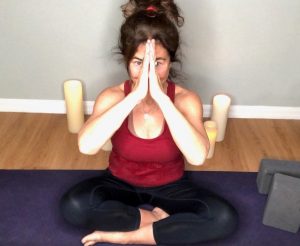Mind Over Music
The power of creative affirmations.
I’ve always been a pretty hard-core “just do it” kind of gal — I set my mind to something and then just get it done. But last year when we were all faced with new obstacles for connecting with our joy (mine in the form of travel, performing live and being in the company of other humans), I felt anxious — desperate for anything that would help me be functional, productive, patient and positive. For what might have been the first time in my life, I couldn’t just snap to it and get it done.
After considering potential solutions, I decided that yoga might help me recognize that I had the capability to manifest changes in my attitudes. Ujjayi breathing alone showed me I could lower anxiety levels and block negative vibes.
So, thought I, if I can calm my nervous system by telling myself to slow down and breathe, couldn’t some positive self-suggestion reaffirm my reflection when I feel, well, invisible? More pragmatically, could it pull me out of my creative funk and remind me that I’ve achieved success before and am on the path to doing so again?
One such self-suggestion comes in the form of an affirmation: a short declaration that states a goal you want to achieve. The idea is that repeating these affirmations can transport them to the subconscious mind, prompting your subconsciousness to bring your goal into reality. For example, saying I am beautiful just the way I am repeatedly can actually give you self-confidence by making you believe you are beautiful just the way you are.
It sounds too good to be true, right? “I will win the lottery!” But “I will win the lottery” is not an affirmation. For affirmations to be effective, they need to be not only positive but personal and specific … and they need to be in the present tense. In other words, we’re not supposed to assert what we want for the future but rather state what we are now. Even if it’s currently not so, we must put it out there as if it is so, or at least in progress.
So, for example, while If I practice, I will reach a high G might be true, the correct way to affirm it would be: I can reach a high G. (Present tense)
Other examples:
I am becoming a successful film composer. (In progress)
Though I may not be as famous as other songwriters, I am special and unique in my own way. (Personal)
Ideas are all around me and my open heart is receiving them. (Specific)
The lyric (or melody) to the last phrase in that chorus is finding its way as I sit here and repeat this affirmation. (Very specific!)
Get the picture? Remember: positive, personal, specific and in present tense (or in progress).
The idea is to repeat these affirmations one at a time, in a quiet place when you’re feeling relaxed, and to do it continuously for about 10 minutes a day. Seems reasonable to me.
Does it actually work? Hard to say. Maybe it’s more like a placebo effect — the idea that a patient who believes they have been given a cure for what ails them is more inclined to feel better. In that sense, an affirmation may be a form of self-hypnosis. Or maybe it’s, as French psychologist Émile Coué would call it, “optimistic autosuggestion” — a technique he developed through which individuals can guide their own thoughts, feelings or behavior.
The power of self-validation, even if it requires a bit of magical thinking, can do wonders. Hey, we’re musicians. We survive on leaps of faith. We believe in the energy of our thoughts and imaginations. Personally, I find it comforting to know that if we temporarily lose our way, we have a means within us to manifest hope and find our way back. These days, I find myself leaving sticky notes on the inside of my medicine cabinet, on my car dash, on my refrigerator door, wherever, as a reminder to make the time to honor my declarations.
So, pick a time. Find your place. Take a deep breath and repeat after me:
“I am — [fill-in-the-blank]”
















